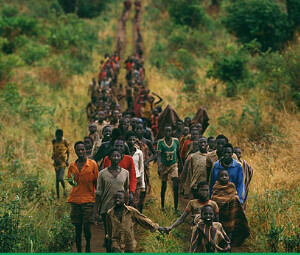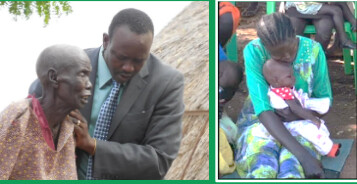Image


Full of emotions, from sadness, resilience, hope and gratefulness, Dr. Jacob Atem paid a recent visit to Dexter to tell the story of his life about being a Lost Boy of Sudan to later becoming an international difference-maker working to bring health, hope and education to where it is lost.
On Sept. 25, Dr. Atem met with students at Dexter High School and Mill Creek Middle School as well as with community members for several presentations about his life as a Lost Boy of Sudan, public health practitioner and global humanitarian. He’s made visits to Dexter in the past. This visit was helped with support from the Educational Foundation of Dexter and LaFontaine Chevrolet of Dexter.
The Sun Times News attended the free public presentation given that evening at Mill Creek.
At one point in his talk, Dr. Atem said, “I’m always about being grateful.”
His story began when he was a young Dinka boy growing up in Maar in South Sudan. He said his job was to wake up at dawn and take the family goats and cows to find grass and water. He recalled that one fateful morning in 1991, when he was six years and out caring for the animals and heard gunfire and screaming back at his village. The rebel forces from Northern Sudan had invaded his home.
He said he knew his family members had been killed or captured, and they had been.
The International Rescue Committee defines the Lost Boys this way: “In 1987, civil war drove an estimated 20,000 young boys from their families and villages in southern Sudan. Most just six or seven years old, they fled to Ethiopia to escape death or induction into the northern army. They walked more than a thousand miles, half of them dying before reaching Kakuma refugee camp in Kenya. The survivors of this tragic exodus became known as the Lost Boys of Sudan.”
 The Lost Boys of Sudan. photo courtesy of the Educational Foundation of Dexter flyer
The Lost Boys of Sudan. photo courtesy of the Educational Foundation of Dexter flyerDr. Atem said he along with an estimated 26,000 to 30,000 young boys whose villages had been destroyed, started walking in an effort to escape. He said they went through Africa’s wilderness where they faced malnutrition, dehydration, exhaustion, communicable diseases, wild animals, and armed gunmen.
He said it was a “treacherous and difficult journey.”
It’s estimated that 10,000 of the boys died before reaching the refugee camps.
Dr. Atem spent a decade at the Kakuma Refugee Camp in Kenya before a new sign of hope came to him from the U.S, specifically from Michigan. He was adopted by woman who lived in Webberville, Michigan. This is where he resettled and began a new life going to high school.
He encountered some new challenges in the U.S., but again he overcame them and found inspiration and hope. He said in America he had opportunity and realized how grateful he was, and how he remains to be.
In high school, he became interested in biology, so he majored in it in college. He said it made him think that someday he might return to the refugee camps as a doctor. He went on to earn a Master of Public Health from Michigan State University and then completed his PhD in Environmental and Global Health at the University of Florida. His dissertation was titled “Characterization of Risk Factors, Morbidity, and Mortality Associated with Diarrheal Disease Among Children Under Five (CU5) in East African Refugee Camps.”
It was in his senior year of college, with a fellow Lost Boy, Luag Deng, that he co-founded the Southern Sudan Healthcare Organization (SSHCO), which provides health education and health care through a medical clinic. He said he it was in the field of public health that he believed he could make a difference in the lives of the vulnerable populations he left behind in Africa.
This became his life goal.
“We wanted to find a way to help those who were left behind and the Southern Sudan Healthcare Organization was born,” he said.
 Dr. Atem back in South Sudan, lending a hand. photo courtesy of the Educational Foundation of Dexter flyer
Dr. Atem back in South Sudan, lending a hand. photo courtesy of the Educational Foundation of Dexter flyerTheir mission is to provide medical facilities, education in healthcare and sanitation, and to assist in the provision and delivery of healthcare supplies.
“We bring health and hope to where it is lost,” Dr. Atem said.
He said they are now raising funds to help operate the operations of two clinics in Africa.
For anyone wanting to learn more or who want to lend a helping hand through a donation, go to http://sshco.org/.